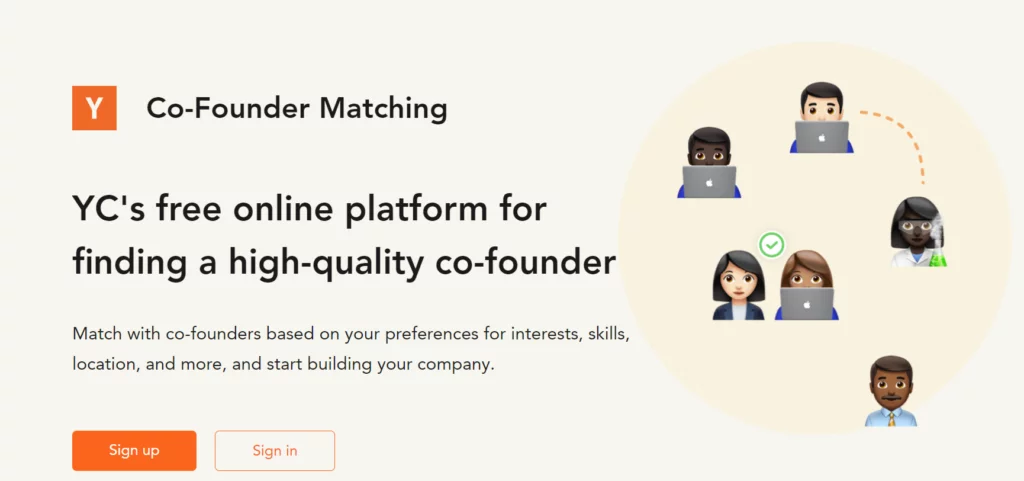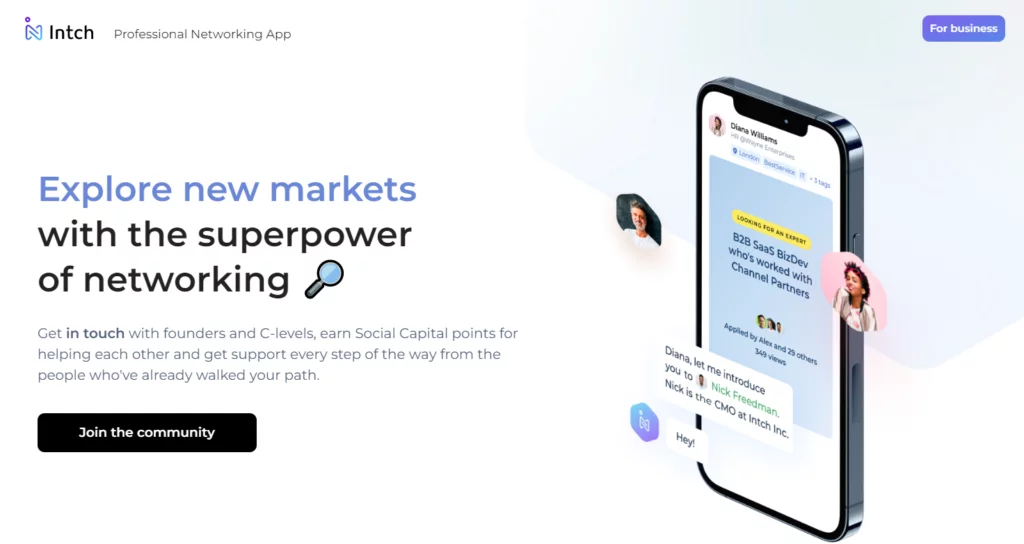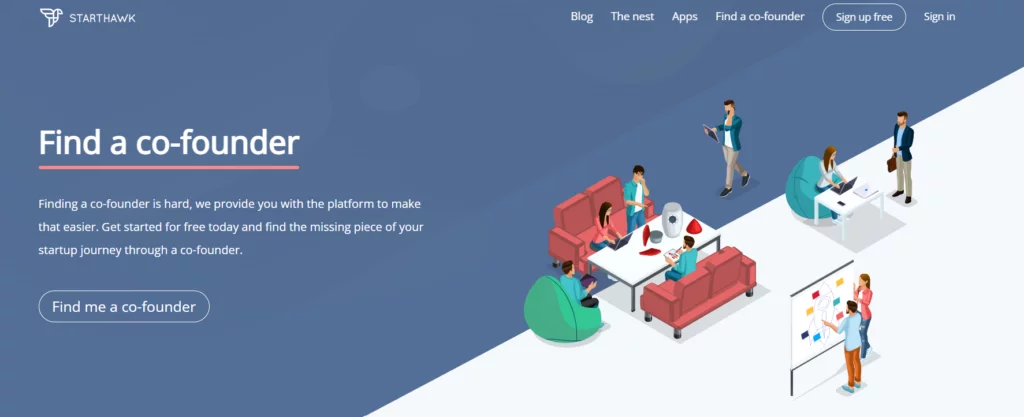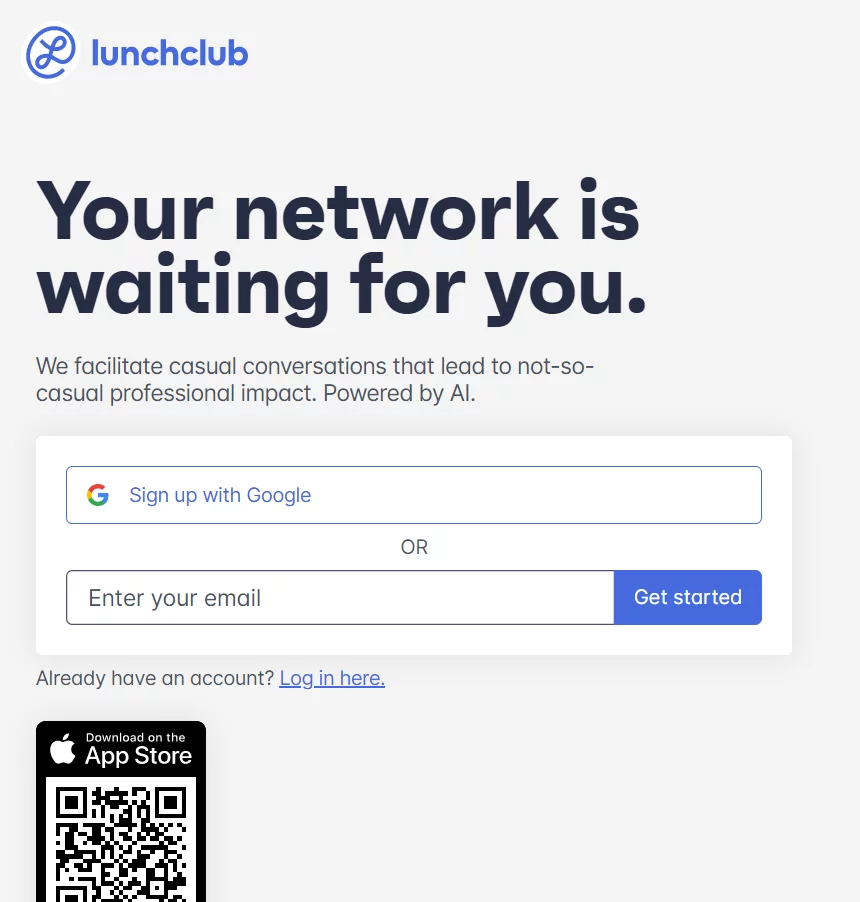Finding the appropriate business partner or company cofounder is increasingly tougher and more challenging in our modern society. Company owners must have locations where they can locate individuals with the necessary skill set to aid in business development. Finding a cofounder is crucial for each firm since they are typically the first employees. Additionally, the success of your startup may depend on this employment. Even if you have a fantastic company concept, you might need to gain the technical know-how to make it a reality. Finding a cofounder might help you realize your business concept if this is your situation. Finding the ideal cofounder to further your concept is complex.
The Qualities of a Cofounder

- A risk-mitigating expert
Find someone who can reduce risks in the first place. Investors are constantly looking for a cofounder for a startup who is persistent and responsible. However, the characteristics persist even if you have not made immediate plans to raise capital. Find a cofounder who owns the business and is fearless in speaking up about their flaws.
It is preferable to look for cofounders with diverse backgrounds. Don’t just rely on one area of expertise, like “programming,” “management,” or something similar. Instead, look for people with a track record of success with just one startup.
- A constructive partner
They aren’t just another employee, even though you may want them to assist you in running your company. Look for cofounders who will assist you in incorporating novel ideas into your company.
Someone with the audacity to spur fresh thinking and identify flaws in the current venture. Cofounders who can reinvent the wheel and make it a derivable car are necessary.
- Offers you a fresh viewpoint
A different perspective on your startup, particularly your product, is another reason to bring on a co-founder. Startup founders frequently need help identifying flaws in their creations, and they need to be made aware that there is a better way to produce the product.
In most startups, the founders hold a weekly meeting to discuss the previous week’s operations and create plans. Additionally, it provides them with the necessary perspective to enhance their offerings.
- Balances your knowledge and skill
Your weaknesses will be balanced out by a cofounder who possesses different knowledge and skills from you. For instance, you can find a cofounder skilled in finances if you are excellent at marketing but not so much with numbers. You can strengthen one another’s skills and create a well-rounded company in this way.
- Shares the Load
Getting things going takes a lot of work. Long days and restless nights are to be expected, and one person cannot manage everything independently. Having a cofounder will help you spread the load and lessen the difficulty of your journey.
- Expands your Network
A cofounder brings their network of contacts with them, which can assist you in expanding your company. This is especially helpful when you’re first trying to get your foot in the door.
Where To Find A Cofounder?
- Personal contacts
Search among your connections for cofounders. How about your coworker who could be interested in a side job? Or perhaps your close buddy from school, who possessed an entrepreneurial spirit? Additionally, you may search for cofounders in your larger network.
Let’s take your brother-in-acquaintance law, whose own software company, as an example. Alternately, begin a joint venture with an active investor who could be interested in raising funds. You begin the practice by presenting your concept to them. They will know if you tell someone what kind of person you’re searching for or what kind of assistance you need.
Remember to share your suggestion with your supervisors and team leaders as well. They may be familiar with individuals who make excellent cofounders.
- Cofounder matchmaking sites
Utilizing crowdfunding platforms like cofounderslab is an additional method of finding cofounders for your firm. It is simple to locate cofounders who are enthusiastic about your business concept.
The fundamental query, though, is: Are matching websites the best venues to look for cofounders, given all the stereotypes associated with them? The solution is to use these tools as a starting point when looking for startup cofounders. Once you’ve selected a few applicants, interview them in person, over the phone, or via Skype to get to know them better.
Top Cofounder Matchmaking Sites
YCombinator’s Startup School

One of the most well-known startup accelerators is YCombinator. They provide a free 10-week online course called Startup School that might assist you in launching your own business.
This program’s cofounder matching tool is one of its greatest features. This implies that you can locate other businesspeople seeking a cofounder with a comparable combination of abilities and perspective.
CoFoundersLab

CoFoundersLab, the biggest network of entrepreneurs in the world, is a fantastic resource for finding a cofounder for your firm. They have a database of more than 100,000 businesspeople from across the globe.
If you have certain requirements, you may utilize their advanced search option to discover someone who fits them. You may also go to their events, which occur in many different places worldwide. In addition to networking, CoFoundersLab’s website provides useful tools, such as mentoring programs and basic startup information.
Intch

An AI-powered networking software called Intch assists business owners in making the proper connections. Signing up and responding to a few questions about yourself is all required.
Following that, their system will pair you up daily with five people with comparable talents or who are seeking your experience. Their site may be used to locate investors, mentors, and advisers for your business.
StartHawk

By browsing and filtering the list of eligible founders who are eager to collaborate on their concept or are open to working on another, StartHawk is a “founder listing” tool that assists entrepreneurs in finding the ideal cofounder for their firm. Sign up and provide the information about your company or concept and yourself.
Your name will then be added to the list of possible cofounders who meet your criteria by their algorithm. You can also utilize their website to find appropriate cofounders based on their qualifications, expertise, and location.
Lunchclub

The social networking site Lunchclub, powered by AI and ML, is to link individuals with similar goals and interests. Sign up, answer a few questions about who you are and what you’re looking for, and then choose a time and day for an online meeting that works for you. The algorithm used by Lunchclub will then pair you with a potential match. The platform touts a 1:1 meeting success rate and has the support of Lightspeed, Coatue, and a16z.
- Social media groups
Next, look for cofounders in startup-related social media groups. Many specialists are willing to join your business and donate their talents in exchange for stock, so look for them. However, you should be aware that many fraudsters on these groups, like on dating websites, attempt to see them in person before entering into any agreements.
Social media:
- LinkedIn: Use search terms you’re interested in and click the “people” filter as well as the location filter to narrow down profiles (for example: “technical lead” in New York City).
- Reddit: The cofounder subreddit is built around helping entrepreneurs find a cofounder; browse previous posts or submit your own.
- Twitter: Many Twitter users list their occupations and areas of interest in their biographies.
When looking for a potential cofounder, you can perform a search using particular criteria (such as “MBA” or “former lawyer”). It’s wise to assess the collaboration once you’ve discovered a potential lead using these techniques. Do a round of interviews or begin exploring alternative options.
- Startup events and conferences
Cofounders can also be seen at conferences and events for startups. It’s easy to locate startup events if you live in a big city. Finding someone who shares your interests in your company and is interested in these events is relatively easy because they take place twice a month.
- Events for networking
Interest groups: From the Society of Professional Journalists to the Association for Computing Machinery, there is a community for practically every sector and expertise.
For instance, conferences hosted by the Entrepreneurs’ Organization or the American Marketing Association; events like the Forbes Under 30 Summit or pitch contests for HubSpot’s INBOUND Accelerator; Consider MIT $100k or Y Combinator’s Online Demo Day.
How to Approach a Prospective Cofounder?

Here are some recommendations to assist you in identifying possible Cofounders once you’ve decided to speak with someone about your idea:
- Explanation of why they should participate
Thinking, “I only want to do something because I believe in my notion” is simple. But the majority of people like to see a distinct value proposition. For instance, if you want to build a platform where users can connect based on shared interests, you should describe the benefits to them.
- Make sure you both understand your goals for the collaboration
You have yet to give the future of your business any attention. If so, give it some thought and create a vision statement. What you want your business or product to accomplish is outlined in your vision statement.
- Get specific
Ensure you are clear about your goal outcome when speaking with prospective partners. For instance, it is too general to say, “We aim to build a platform that connects businesses and customers.” Say something like, “We want to develop a website that allows businesses to advertise to customers” instead.
- Ask Questions
Avoid using phrases like “What do you think” or “Why do you think that?” These kinds of remarks put pressure on your partner to reply right away. Use open-ended inquiries as an alternative, such as “Can you tell me more about…?” and “Tell me more about your experience constructing XYZ.”
- Listen more than you speak
You aim to gain knowledge about your companion. Only try to communicate after you fully comprehend your partner’s desires. Instead, concentrate on getting as much information about them as you can. After that, you can choose whether to continue in a partnership.
- Take advice from one another
You may realize that you have various strengths and weaknesses after two or three meetings. You must work hard to balance the things you bring to the table if you wish to flourish as a team.
- Discover how they prefer to work
You may need to learn how your partner prefers to do tasks. Ask them directly about their preferred working method as a result. You could ask, “How would you prefer to connect with me?” Or “How often should we meet?”
- Be aware of their priorities
You don’t want to waste time working on projects that aren’t in line with your priorities, so finding out what their priorities are is crucial. For instance, it’s best to make this clear immediately if one of you wants to create an MVP (minimum viable product) while the other would rather spend his time creating a business plan.
- Offer value to your partner
Finally, make sure to communicate with your partner to demonstrate your understanding of their objectives so that you can add value. They feel more assured that working with you will be advantageous for them.
- Talk to them honestly
Never exaggerate your true desires in a relationship. No matter how sincere your motives are, lying will never make you popular. Instead, be truthful about why you want to pair up.
How to Pay the Cofounders?

Most first-time business owners frequently mix up WHAT and HOW MUCH they should pay the cofounder. When an investor is a part of the startup, things become complicated.
Two methods exist for compensating a cofounder.
- Equity
It can be challenging to decide whether to pay a startup cofounder with equity or a salary. Regarding the two, opinions are divided, and some even contend that remuneration for work and ownership in the company are two entirely different things. Say you are making your payment with equity. The issue of dividends and equity value is then raised. There is no absolute law.
Everything depends on your cofounder’s contribution; you could give him 20% of the business as payment. However, when an investor is involved, you cannot make this choice because the investor is also your bedmate and will make the financial decisions instead of you.
- Salary
He is not a cofounder if you intend to pay the startup cofounder solely with a salary. Is he?
Like the early Google cofounders, you can refer to him as a founding member of the team. They did hold an equity stake, but they were merely programmers and developers following the instructions of Google’s cofounders. They were paid, to put it simply. So, what do we perceive from it?
FAQs
How many founding partners are too many?
Although there is no ideal number of cofounders for a startup, two are the most typical. The likelihood of success can be increased and risk reduced by having multiple founders.
Having more than one founder protects the business if one founder departs?
The advantages of multiple founders include:
- lowers risk. If one person leaves, there will still be someone else who has gone through similar situations and is a pro.
- It improves success chances. The team is bigger, so there will be more people to divide the workload.
- It makes it simpler to run a business. Fewer decision-makers mean that everyone is in charge.
How much equity should I assign to my cofounder?
The answer always depends on your startup situation and long-term goals because it is a more complicated subject.



